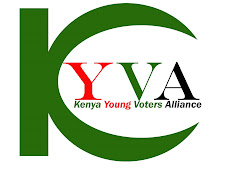KYVA is a conglomerate of organizations and individuals committed to ensuring that Kenya as a country manages to achieve set developmental goals to meet both the international and national targets. The idea was mooted by the (SONU) leadership of 2003/4. KYVA leadership is composed of diverse backgrounds and experiences. We urge all Kenyan youths to take charge of leadership at the counties and national levels. Register as voters and vote in large numbers for young visionary leaders.
Sunday, April 24, 2011
WHY I WILL NAME MY SON "INFLATION WANJALA."
My friends laughed uncontrollably when I told them that I intend to name the child who is soon to replace my acting last born, “Inflation Wanjala.” They wondered why I objected to the many funky European names that they had suggested. Some said that if I insisted on the name, then I will be stark, staring bonkers. To their utter consternation, I stuck to my guns.
You see, “Wanjala is a luhya name meaning “hunger.” The reason why I chose this name is because it collocates with “inflation” and the two effectively capture the historical significance of this period.
When “Inflation Wanjala” comes of age and demands to know why I chose such a name for him, I will tell him that he was born when millions of Kenyans bore the brunt of a voodoo economy. I will tell him that he is a living testimony of a dangerous trend that emerged in the country. This was a time when our country was experiencing a growing pattern of chronic artificial inflation in the months leading to the 2012 general election.
Even though my knowledge in matters economics may be fuzzy, trust me to demonstrate to him, a link between inflation and general elections in Kenya. I know for sure that in the preceding electioneering years, inflation was always a dominant variable. It came in different styles and sizes and severely affected public and private economic planning.
I will remember to tell him that a coterie had engendered a pervasive and sustained rise in the aggregate level of prices of essential products and services. The cost of living spiraled to over two hundred percent while salaries remained at an all time low. I had to walk up to twenty kilometers each day to and from my work station because the commuter fee had more than doubled. Never mind that like millions of other helpless Kenyans I considered breakfast and lunch mere luxuries.
I will tell him that the mysterious fat cats (coterie) had a hidden paw and the movement of a snake. They were criminals who used their intellect to defy the law. They surrounded themselves with the Harvard legalese. They even baffled criminal investigators and caused them constant despair; for when they reached the scene of the crime, the fat cats were simply not there. Not even their footsteps could be traced. Theirs was suavity and deceitfulness par excellence. Simply put, these were the true Napoleons of corruption, the crème de la crème.
So powerful were they that they even engendered panic and fear among those tasked with regulating the energy sector. All that the subservient regulators could do was wag their tails and quote non-existent increases in the price of crude oil at the global market and piracy as reasons for the skyrocketing oil prices in the country. None of them could explain why oil prices in other non-oil producing countries were much lower than in Kenya.
Like the proverbial cat and mice, the legislature animatedly talked of the need to bell these wily fat cats but none of them (legislators) was willing or courageous enough to take up that noble task. None of them stood his ground to save Kenya from the litany of grand scams in the oil industry.
The executive too seemed incapable of directing its attention to the seriousness of these criminal depredations and at worst they seemed to be prisoners of the small coterie who ruled in their name. Buoyed by a contingent of hungry policemen at their disposal, this coterie cared less of the possibility of a social implosion. After all, they could deploy the police force to arrest the dying men and women whose groans disturbed their comfort zones.
All the while, the coterie executed the most base and abominable economic crimes over millions of their fellow citizens. The economy at large toiled for rapine. The civil servant, teacher, policeman, doctor and all other laborers did sweat, not for their own benefit, but for the luxury and rapacity of the fat cats of depredation. Ours was a country where forty millions Kenyans, gifted by Providence with the ordinary endowments of humanity, groaned under the weight of an artificial inflation.
I will tell “Inflation Wanjala” that his name ought to be a constant reminder to him and to his generation of the folly of letting a coterie whose good fortune springs from the calamities of its citizenry and whose aggrandizement grows out of the miseries of their fellow humankind to take charge of their collective destiny.
Subscribe to:
Post Comments (Atom)

No comments:
Post a Comment